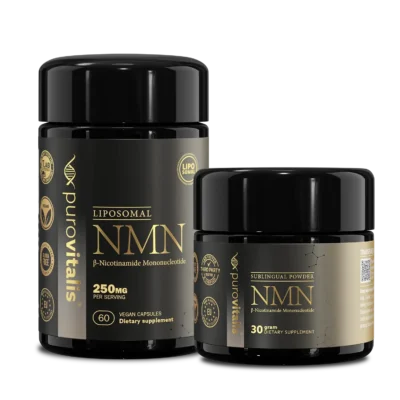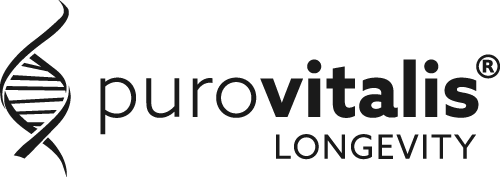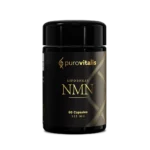
Introduction
Nicotinamide Mononucleotide (NMN) is a precursor to NAD+, a vital molecule essential for cellular metabolism. NMN is gaining recognition as a promising supplement for boosting energy levels, slowing aging, enhancing metabolic function, and even improving age related fertility. However, many individuals question its safety and potential side effects. In this article we examine the latest scientific findings regarding the safety of NMN safety and any potential risks.
Is NMN safe?
Numerous studies have examined the safety of NMN supplementation, consistently showing positive results across various aspects of human health. Research has demonstrated that NMN is well-tolerated in both animal and human trials. In humans, a growing number of studies over time continue to confirm that daily NMN supplementation is safe, with no measurable risks reported [1,2]. As research advances, more and more human trials are being conducted to further investigate NMN’s impact on health, aging, and longevity. Its potential benefits for longevity and cellular health have even led many scientists and healthcare professionals to incorporate NMN into their own routines.
A study conducted by Andrea Maier et al. (2022), who is also Purovitalis scientific advisor, examined NMN safety and efficacy in humans. The study followed participants taking NMN daily for six months and found significant improvements in energy levels and metabolic function. No severe side effects were reported, further supporting NMN’s safety profile based on human consumption.
More insight in the study here: Study: Efficacy and Safety of NMN Supplementation in Healthy Middle-Aged Adults
Another study from 2024 found that NMN was safe at all tested doses, with no serious side effects reported. The studies reviewed covered different dosages of NMN, with 300 mg/day being the most common and 900 mg/day providing stronger results in areas like muscle function.
Read the full study here: Human NMN studies reviewed: benefits for muscle and liver health.
NMN side effects
Several studies have examined the safety of NMN supplementation, reporting positive findings:
- Long-term animal study: Rat studies conducted over 12 months found no serious or toxic effects from NMN supplementation[3].
- Short-term human study: A study with 10 healthy men (aged 40–60) found no safety concerns after a single oral dose of 100, 250, or 500 mg NMN. Five hours after intake, no changes were observed in body temperature, blood pressure, heart rate, or oxygen levels. Lab results remained within normal ranges[4].
- Clinical trial with daily NMN supplementation: In the same study already referenced with Purovitalis’ scientific advisor Andrea Maier, daily doses of 300, 600, and 900 mg NMN were well-tolerated with no serious side effects. Only 9 mild adverse events were reported, 6 of which occurred in the placebo group.
While NMN has been reported safe in more clinical human studies, there have been some side effects reported from NMN supplementation, such as mild digestive discomfort, including bloating, nausea, or an upset stomach. These effects are usually temporary and can be minimised by taking NMN with food or adjusting the dosage.
Does NMN cause cancer?
Some individuals may also have concerns about the long-term safety of NMN, particularly its potential impact on cellular processes. Since NMN boosts NAD+ levels, which play a key role in energy metabolism and cell function, some fear that excessive NAD+ activation could influence unwanted cell growth. However, current research has not established any link between NMN supplementation and increased health risks, including cancer. Most human studies indicate NMN is well-tolerated, though long-term data is still limited.
The concerns about NMN side effects cancer risks come from misinterpreted mouse studies, which showed that lowering NAD+ levels in brain tumor cells slowed their growth. This led to the misconception that NAD+ causes cancer. However, there is no evidence that NMN or NAD+ supplementation increases cancer risk in healthy individuals, and human studies support NMN’s safety.
In fact, an in vivo study from 2023 shows that high-dose NMN can inhibit the growth of lung adenocarcinoma in mice[5]. The study found that NMN triggers ferroptosis, a specific form of cell death, by increasing nicotinamide levels, which disrupts the cancer cells’ energy balance. The effect was even stronger when the enzyme NAMPT, which normally counteracts this process, was inhibited. The results suggest that high-dose NMN may have anti-cancer properties.
NMN and sleep: How to avoid NMN side effects on sleep quality
Some people may experience difficulty falling asleep after taking NMN. This is due to the increased energy levels that occur when NAD+ levels are boosted. To minimize the risk of NMN side effects on sleep, it is best to take NMN in the morning. This helps optimize NMN sleep quality by allowing your body to use the extra energy during the day, reducing the likelihood of NMN sleep disturbances at night.
Dr. David Sinclair and NMN
Dr. David Sinclair, professor of genetics at Harvard Medical School, is one of the most well-known researchers in aging and longevity. He has played a key role in bringing NAD+ boosters like NMN into the spotlight and has personally taken NMN daily for years.
Sinclair has discussed in his books, interviews, and podcasts that NMN may help support cellular energy and slow down the aging process. His research has shown that NAD+ levels decline with age, which affects cells’ ability to repair damage and function optimally. By taking NMN, he aims to restore NAD+ levels and promote healthy aging.
He has reported personal benefits from NMN, such as increased energy and improved physical performance, but also emphasizes that more human studies are needed to confirm long-term effects. Sinclair has also mentioned that he combines NMN with other compounds like resveratrol and metformin as part of his personal approach to longevity.
His research has inspired many to explore NMN supplementation, but he consistently advises people to follow scientific developments and consult experts before starting new supplements.
NMN Side effects with high dosage
Due to limited long-term studies, the optimal NMN dosage remains unclear. However, research has shown positive effects from doses ranging between 250 mg and 2,000 mg per day.
Recent research suggests that a daily dosage of 500 mg of NMN is safe and beneficial for both physical and mental health. For individuals over 60 years old, an oral intake of 250 mg per day may be sufficient to support the body against age-related changes.
One recent clinical study found that taking 200–300 mg of NMN daily for up to six months provided consistent health benefits. Collectively, these findings confirm that NMN is safe for human consumption and may support healthy aging.
Learn more about NMN powder dosage and schedule here.
Quality of NMN
The effectiveness of NMN supplements depends on their quality. Only a high-purity supplement, developed and tested in a controlled laboratory setting, can deliver optimal results.
At Purovitalis, we ensure the highest standards by using liposomal technology, clean-room production, and third-party testing, guaranteeing 99%+ purity and superior absorption. Learn more about our clean-label commitment here.
Liposomal technology
Liposomal delivery uses liposomes to protect active ingredients and transport them directly to target cells, improving absorption and effectiveness. Our patented Liposomal Technology boosts bioavailability by 90%, allowing for smaller serving sizes with greater impact. Compared to regular NMN, liposomal NMN is absorbed faster, works more efficiently, and provides a longer-lasting effect on NAD+ levels.
Learn more about our Liposomal technology here.
Conclusion
NMN is a well-researched supplement that plays a key role in supporting cellular health, energy levels, and longevity. Scientific studies confirm that NMN is safe for human consumption, with minimal side effects such as mild digestive discomfort or temporary sleep disturbances, which can be managed by adjusting the dosage or timing. Concerns about NMN and cancer stem from misinterpreted studies, while recent in vivo research suggests that high-dose NMN may even have anti-cancer properties.
However, it is important to remain critical of supplements, stay informed on the latest research, and listen to your body. If you experience any side effects, consult your healthcare provider.
References:
- The efficacy and safety of β-nicotinamide mononucleotide (NMN) supplementation in healthy middle-aged adults: a randomized, multicenter, double-blind, placebo-controlled, parallel-group, dose-dependent clinical trial
- The efficacy and safety of β-nicotinamide mononucleotide (NMN) supplementation in healthy middle-aged adults: a randomized, multicenter, double-blind, placebo-controlled, parallel-group, dose-dependent clinical trials,
- Long-Term Administration of Nicotinamide Mononucleotide Mitigates Age-Associated Physiological Decline in Mice
- The First Clinical Study Shows a Key NAD+ Intermediate NMN Safe for Human Use
- High-Dosage NMN Promotes Ferroptosis to Suppress Lung Adenocarcinoma Growth through the NAM-Mediated SIRT1–AMPK–ACC Pathway

NMN supplements Europe based Liposomal delivery
Our NMN supplements are here for you to help you shine and feel your best! Try it out!













